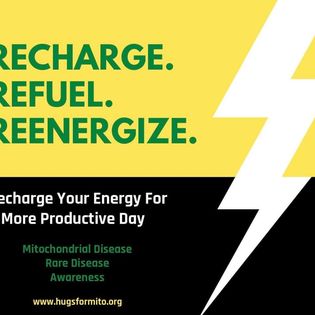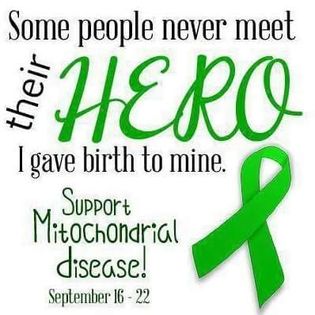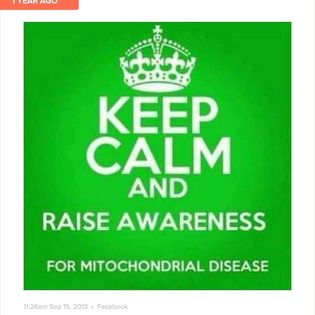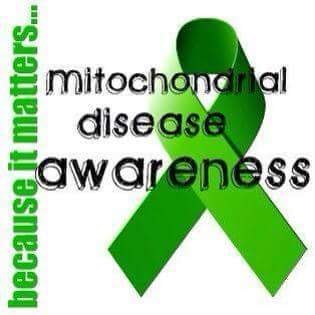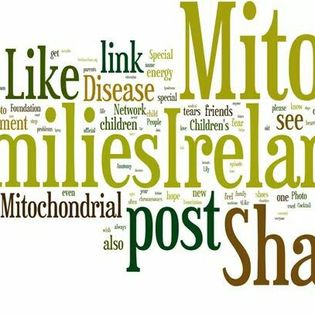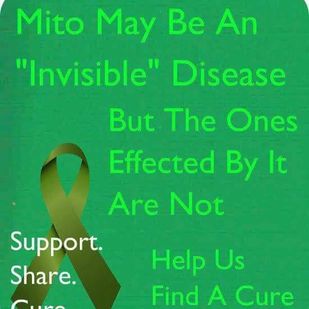We try and update this site with new things from our facebook page but if you want to see them in real time as they get posted then head over to the page.
Mito Disease:Cunning,Baffling, and Insidious. Like any disease without a cure, it robs, it steals, and it ruins lives. It takes our infants from us, before we can even hold them. It puts too many angles in the grave, before they can even grow up. It robs a grandparent from being able to hold their granchild. Mito robs a mother or father from being able to raise their children. Please make awarness, so that our world, relizes that they are not invisible any longer.
We need a cure!
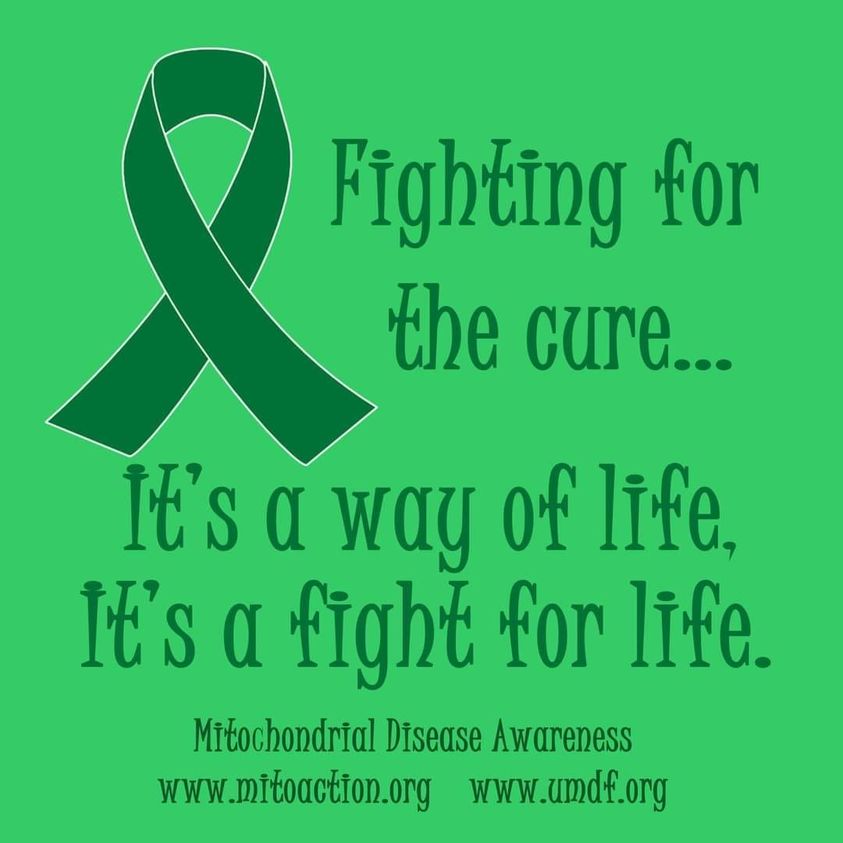
The parts of the body that need the most energy, such as the heart, brain, muscles and lungs, are the most affected by miyochondrial diseas. The affected individual may have strokes, seizures, gastro-intestinal problems, (reflux, sever vomiting, constipation, diarrhea,) swallowing difficulties, failure to thrive, blindness, deafness, heart and kidney problems, muscle failure, heat/cold intolerance, diabetes, lactic acidosis, immune system problems and liver disease
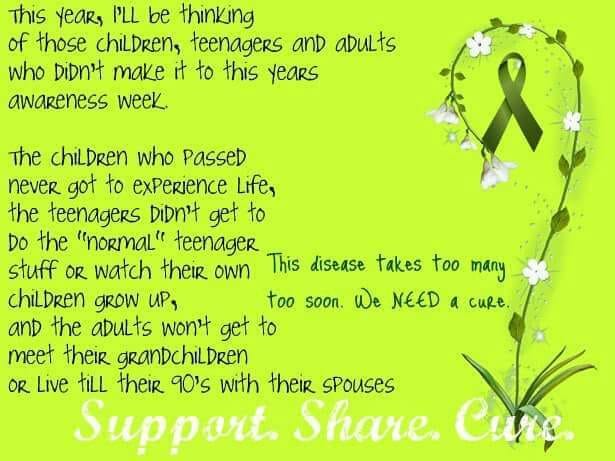
Since mitochondrial disease is often referred to as an energy crisis in cells, it may be a misunderstanding that this disease is all about lack of energy or fatigue. Don't get me wrong, overwhelming fatigue is a daily occurrence for many but there is so much more to this disease than lack of energy or being tired. It is also about:
It's not just 'I'm tired' - If only it were that easy...

One day people will understand the effects of mitochondrial disease, the systems it breaks down will be known to others. There is no treatment and no cure therefore medicines and supplements thought to work are rarely covered by insurance. Parents drive 100s of miles to get to a mito clinic, there are few hospitals equipped to handle this disease. Parents with a child effected by this disease struggle financially everyday. One day mitochondrial disease will be a household name just like cancer. maybe then people will understand, but until that day i will educate you. give you info i will fight for this disease to be known and understood. I will stand for the children still fighting this disease and i will stand for those who have lost their battle with mito.
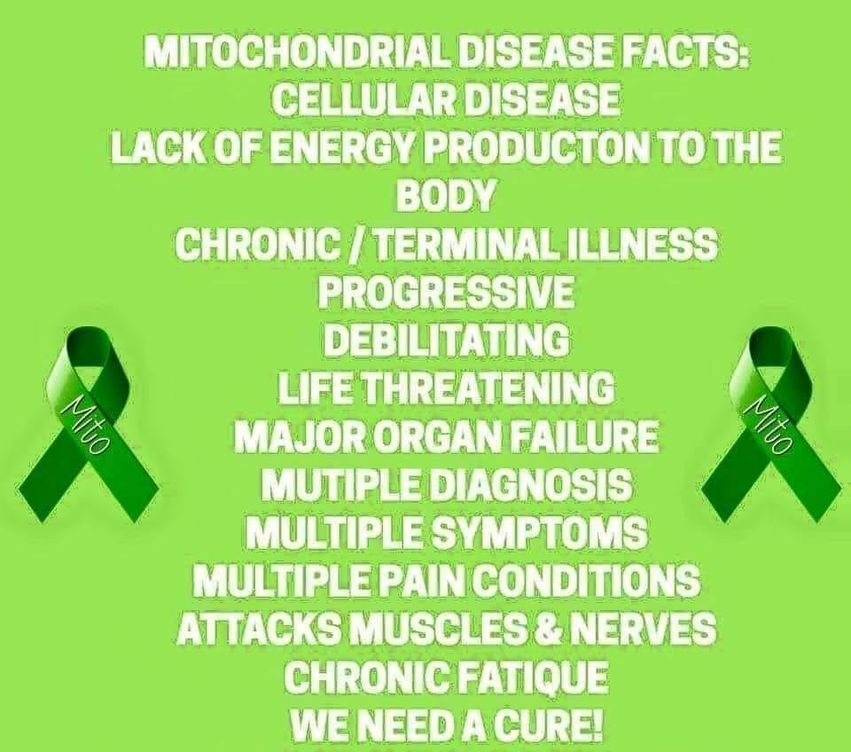
Losing a child - Do you want to know what it is like to lose a child? Sit down, this could take quite a while.
At first you are in shock, and then you are in denial. And pretty soon reality puts your emotions on trial.
You lose so much, but the first you lose is your smile. To others you seem okay, but you really are not.
The grief that you feel is only the start. Because your child now lives only in your heart. You treasure each picture that is all you have got.
You cling to memories that you thought you forgot. You know your life will never again be the same. You pretend things are okay, and you hide your pain.
You just want someone to mention his name. So you can imagine that he is beside you again. Sometimes you feel like you are going insane.
You still feel all alone, even when in a crowd. Others can speak of their children of whom they are proud. But to talk about your child, somehow isn't allowed.
So your child's memories are hidden under grief's cloud. You just want to mention his name out loud. With each day you are reminded of all you have lost.
And how much your loss has ultimately cost. Your child's hopes and dreams have been tossed.
So before you judge, keep your fingers crossed
That you never know the pain of a child's loss.
You hold back tears, because they would be a stream. You cry every day, but you really want to scream. My child mattered, how can people be so mean?
You pray for a visit, or vision in the form of a dream. So before you tell me some over used silly cliche.
Like "He is in a better place" or "things are better this way".
Think about what you are about to say. I really mean it when I tell you, that I hope and pray - that you never know how I feel each and every day.
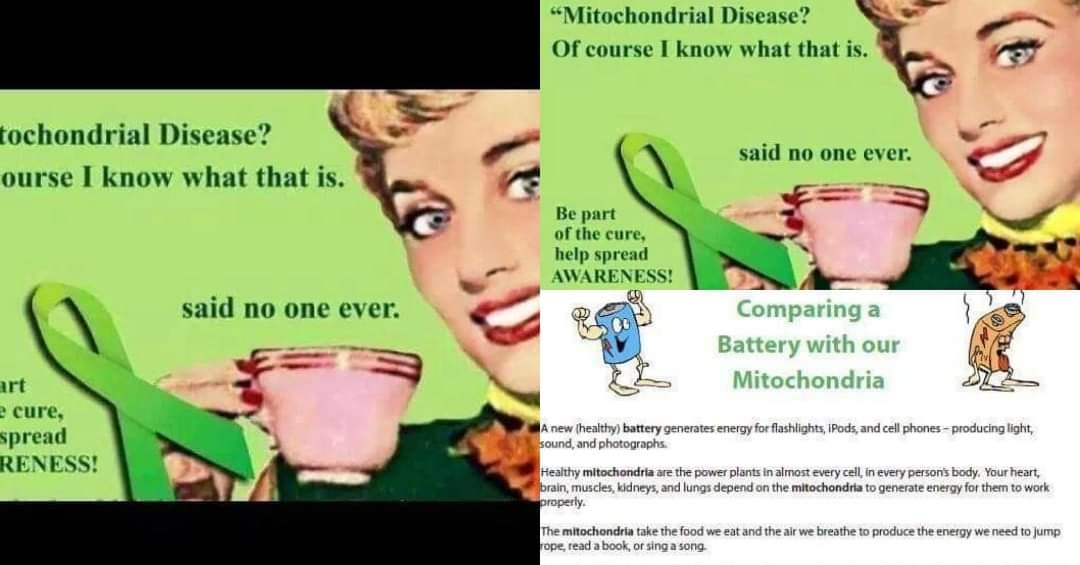
10 things bereaved Parents wish you knew
~ Auther Unknown
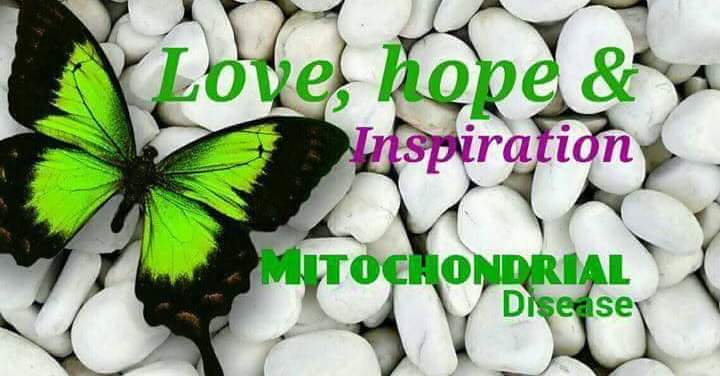
Mitochondrial diseases result from failures of the mitochondria, specialized compartments present in every cell of the body except red blood cells. Mitochondria are responsible for creating more than 90% of the energy needed by the body to sustain life and support growth. When they fail, less and less energy is generated within the cell. Cell injury and even cell death follow. If this process is repeated throughout the body, whole systems begin to fail, and the life of the person in whom this is happening is severely compromised. The disease primarily affects children, but adult onset is becoming more and more common.
Diseases of the mitochondria appear to cause the most damage to cells of the brain, heart, liver, skeletal muscles, kidney and the endocrine and respiratory systems.
Depending on which cells are affected, symptoms may include loss of motor control, muscle weakness and pain, gastro-intestinal disorders and swallowing difficulties, poor growth, cardiac disease, liver disease, diabetes, respiratory complications, seizures, visual/hearing problems, lactic acidosis, developmental delays and susceptibility to infection
The conventional teaching in biology and medicine is that mitochondria function only as "energy factories" for the cell. This over-simplification is a mistake which has slowed our progress toward understanding the biology underlying mitochondrial disease. It takes about 3000 genes to make a mitochondrion. Mitochondrial DNA encodes just 37 of these genes; the remaining genes are encoded in the cell nucleus and the resultant proteins are transported to the mitochondria. Only about 3% of the genes necessary to make a mitochondrion (100 of the 3000) are allocated for making ATP. More than 95% (2900 of 3000) are involved with other functions tied to the specialized duties of the differentiated cell in which it resides. These duties change as we develop from embryo to adult, and our tissues grow, mature, and adapt to the postnatal environment. These other, non-ATP-related functions are intimately involved with most of the major metabolic pathways used by a cell to build, break down, and recycle its molecular building blocks. Cells cannot even make the RNA and DNA they need to grow and function without mitochondria. The building blocks of RNA and DNA are purines and pyrimidines Mitochondria contain the rate-limiting enzymes for pyrimidine biosynthesis (dihydroorotate dehydrogenase) and heme synthesis (d-amino levulinic acid synthetase) required to make hemoglobin. In the liver, mitochondria are specialized to detoxify ammonia in the urea cycle. Mitochondria are also required for cholesterol metabolism, for estrogen and testosterone synthesis, for neurotransmitter metabolism, and for free radical production and detoxification. They do all this in addition to breaking down (oxidizing) the fat, protein, and carbohydrates we eat and drink.
Mitochondrial diseases are the result of either inherited or spontaneous mutations in mtDNA or nDNA which lead to altered functions of the proteins or RNA molecules that normally reside in mitochondria. Problems with mitochondrial function, however, may only affect certain tissues as a result of factors occurring during development and growth that we do not yet understand. Even when tissue-specific isoforms of mitochondrial proteins are considered, it is difficult to explain the variable patterns of affected organ systems in the mitochondrial disease syndromes seen clinically.
Because mitochondria perform so many different functions in different tissues, there are literally hundreds of different mitochondrial diseases. Each disorder produces a spectrum of abnormalities that can be confusing to both patients and physicians in early stages of diagnosis. Because of the complex interplay between the hundreds of genes and cells that must cooperate to keep our metabolic machinery running smoothly, it is a hallmark of mitochondrial diseases that identical mtDNA mutations may not produce identical diseases. Genocopies are diseases that are caused by the same mutation but which may not look the same clinically.
he converse is also true: different mutations in mtDNA and nDNA can lead to the same diseases. In genetics, these are known as phenocopies. A good example is Leigh syndrome, which can be caused by about a dozen different gene defects. Leigh syndrome, originally a neuropathological description of the brain of one affected child, was described by Denis Leigh, the distinguished British physician, in 1951. It is characterized by bilaterally symmetrical MRI abnormalities in the brain stem, cerebellum, and basal ganglia, and often accompanied by elevated lactic acid levels in the blood or cerebrospinal fluid. Leigh syndrome may be caused by the NARP mutation, the MERRF mutation, complex I deficiency, cytochrome oxidase (COX) deficiency, pyruvate dehydrogenase (PDH) deficiency, and other unmapped DNA changes. Not all children with these DNA abnormalities will go on to develop Leigh syndrome, however.
Mitochondrial diseases are even more complex in adults because detectable changes in mtDNA occur as we age and, conversely, the aging process itself may result from deteriorating mitochondrial function. There is a broad spectrum of metabolic, inherited and acquired disorders in adults in which abnormal mitochondrial function has been postulated or demonstrated.
Thanks to Pam Meehan for this informative description.
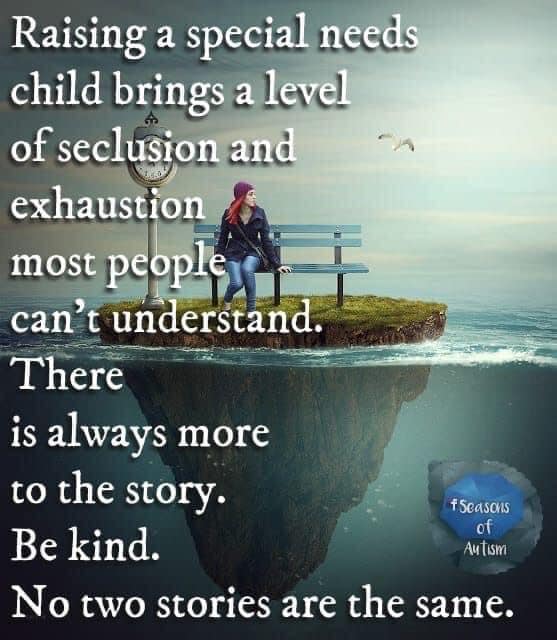
What do you want to be when you grow up?
The possibilities seem endless, or are they? What if your only answer was alive and well?
What if you had Mitochondrial Disease? You body would not be able to make the energy your cells need to survive.
Its progressive and debilitating, meaning it only get worse the damage is permanent and irreversible.
What if someone you knew had a disease that was slowly robbing them of there lives and no one had heard of it.
There is very little funding due to its rare disease status, meanwhile more children die from mitochondrial disease related illnesses then all childhood cancers combined.
1 in 4,000 children will develop a form of mitochondrial disease by age 10.
We are all worth a cure, yet as of right now mito has no cure.
Emily is five years old.
She is a little girl, full of spunk who loves to play and is always wearing the biggest brightest smile.
She stays positive in spite of all she endures. Her body is failing her. Without her cooling vest, home nurse, feeding tube into her intestines,
15 medications twice daily, extensive hospitalizations and constant doctor visits she would not have survived this far.
We are beating the odds right now! We need to fight while we still can and have hope.
Emily is not her disease she is a... sister, friend, niece, cousin, classmate, granddaughter, daughter, neighbor and loved deeply by all that know her.
Would you like to join the battle for her life, yes you can make a difference for her and others like her.
United Mitochondrial Disease Foundation is working for a cure and awareness.
You can learn more at UMDF.com and learn more about Emily on facebook at Emily Anderson Foundation.
Thank you for your time and support. Everyone deserves a cure, don't they?
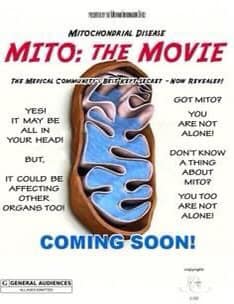
Message from consultant respiratory paediatrician at cork university hospital. I hope you all stay safe during this difficult time. The children will get through this no problem . Paediatric hospitals are empty in Italy at present after 3 weeks of school closure as the usual viruses stopped circulating. Remember with corona children are vectors not victims. In most epidemics young children are the transmitters. Therefore for school closure to be effective it’s really important that the kids aren’t mixing with other kids while out of school. They will give it to each other silently pass it on to our loved ones. What we do now will contribute to how this develops in cork. Avoid situations that the children will interact . If the community respond to this it will shut it down more than anything we do in hospital. From my experiences in the hospital this last week I would say that corona virus is closer to all of us than we realise and the degrees of separation for all of us is getting narrower. I’m not that good at social media but if this could be shared as widely as possible with parents in cork it will help. This messsge needs to go viral to stop the virus.
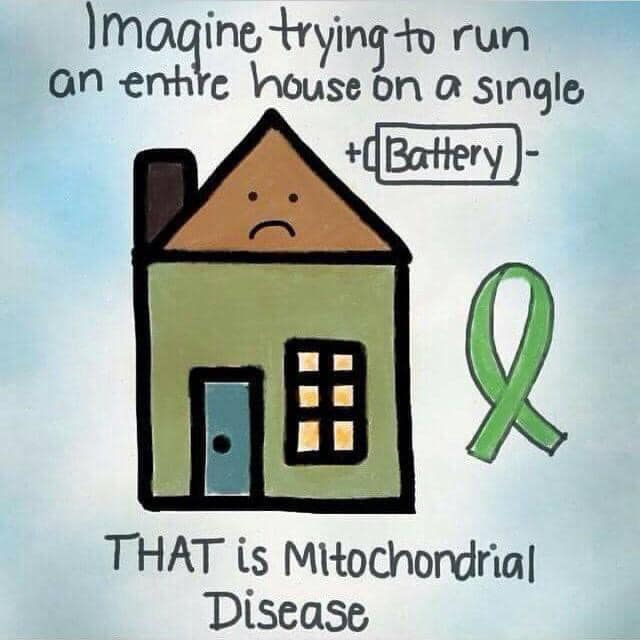
Here are some poems a person that is in our community facebook page wrote a couple of years ago, he wrote them normally out of frustration it seemed to help him.
By Andrew Alexander
Mito Poem
Mito what the hell Don't know what it is but feel unwell A pain here a pain there Doctors don't seem to care Arms ache, legs ache, back ache, head ache Much more of this and I think I'm going to break I feel I am at the hospital everyday I wish for once this pain would go away Do your exercise everyday and the pain will go away Take you medicine as you should Stop complaining and try to be good I wish that people would try to understand When I feel like this it is not very grand No sleep no matter how I try Much more this and I will cry Energy I seem to have no more It feels like death is knocking at my door But as MC Hammer used to say You have to pray just to make it to day So I look to the heavens above And ask God for his love With the power of God at my feet I know this Mito we can beat.
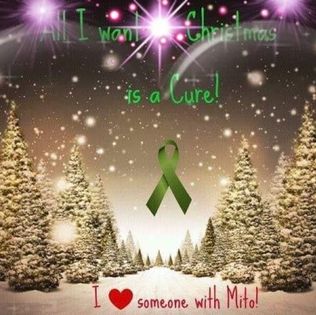
How are you today?
I scream but no one hears I cry but with no tears They listen but don't hear They don't understand my biggest fear They look but they don't see This demon from hell living in me They speak but they don't say a word This mito thing they have never heard They touch but don't feel a thing Only me this pain will sting They look at me I look the same They cannot feel all my pain These people love me and they care And I know they will always be there I always ask God when I pray To give me strength not to push them away
There are other poems that Andrew Alexander wrote on the facebook page if you want to read the rest head on over there.
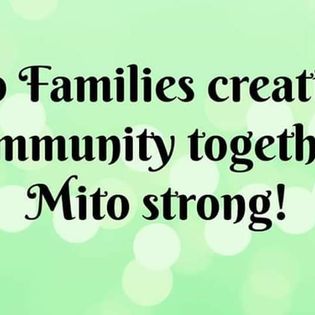
we are a group of parents and adults who together in Ireland have been trying to raise awarness for mitochondrial disease all complexes. when this page was started and we learnt both my children were diagnosed with mito. we were told they were the only children with mito. so we set up a facebook page which is the first link at the top of this page to see were there other parents out there who was told the same thing. To discover there were many other parents of children who had been told the same thing. we discovered over a period of time that there was many other parents out there and we also discovered that their were also adults that were told they had this rare condition. couple years in we made that page private and opened up a community page of the same name to still push for the puplic and medical professions especially. to realise that there were many families and adults. in that time we made many friends from all over the world who were also dealing with the same issues as us. together we were able to gain information from each other and forge new fiendships. some of these people were years ahead in their diagnosis and gave us very valuable and useful information. we hope that you will be able to gain the knowlage we all have now and stay united as a mito family and community. were hoping to get those in the medical field.
(think outside the box)
when you hear hoof beats dont think of horses think zebras
